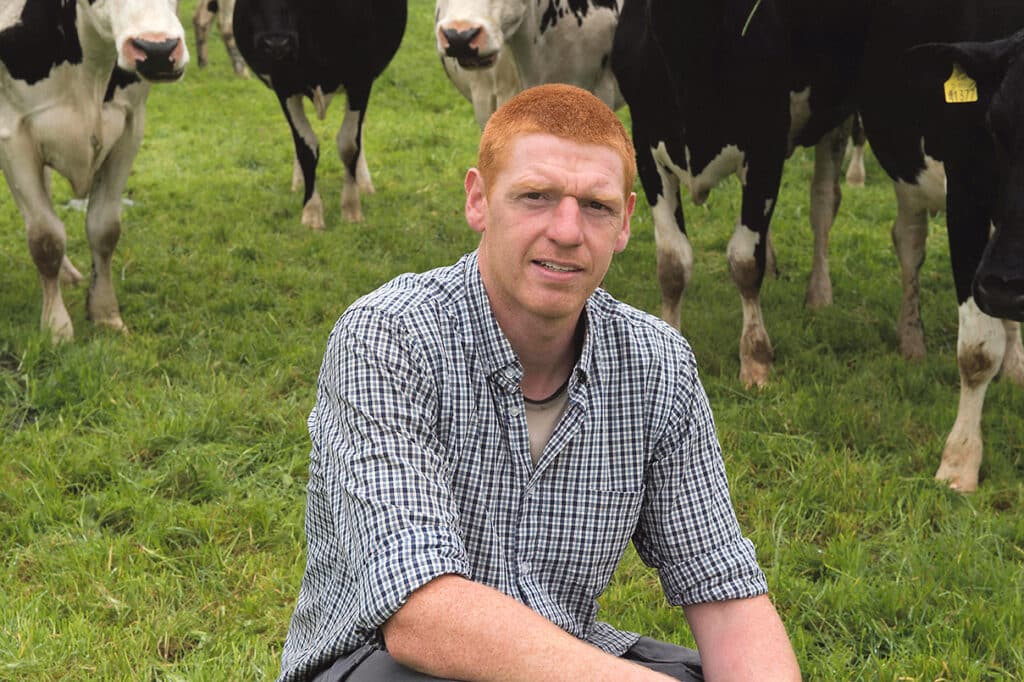
This year’s Carbery milk quality award winner’s farm walk was a virtual event. A joint Carbery group and Teagasc event, it was held in the middle of July on the farm of Tadhg Hurley, Barleyfield, Kilbritain.
Congratulations Tadhg on winning the 2020 Carbery milk quality award. Tell us about your farm?
My grandfather bought the farm in 1936. Currently we’re milking 75 Holstein Friesian cows on 90 acres supplying milk to Barryroe Co-op. The farm is about 400 feet above sea level and last year we grew 12 ton of grass per hectare and fed around one ton of meal per cow. Last year we supplied 460kgs of milk solids per cow. I took over the farm from my father Finbarr in 2014 and he gives me a hand around the place. He has high standards, as he had previously won the milk quality award for Barryroe in 1999 and 2009.We’d put a big emphasis on animal health. 65 per cent of the herd have never received an antibiotic in their lifetime.
What’s a typical year like on the farm?
We start calving cows in January and that’s our busiest time. In 2020 we had a six-week calving rate of 87 per cent. Because labour is so high in January and February, we like to have a break before breeding starts, so calving is usually finished by March 10. We turn cows out to grass around the middle or end of February. It’s hard to get them out and we try to do first cut silage around May 20-25. We try to keep the cows out then until into December.
Breeding can be tough going. That’s the time of year where I don’t leave the farm at all. We’d be watching the cows a few times a day. Calving is easier in comparison because you have a fair idea of when they’ll calf. With breeding there is more unknowns and you have to pay more attention. It’s all AI: There hasn’t been a bull on the farm since 1983. We stop breeding at the end of June.
You said on the farm walk that you asked for the farm when you were 21. Tell us about that?
I finished agricultural college and thought I’d shift the world at that stage if I had a big enough crow bar. It had been busy through January and February and I remember asking Dad at the breakfast one morning would he sign the farm over to me and he said no. He said I was too young and to go away and get a trade or work for a different farmer for a bit.
He still had some things he wanted to do and he told me that I could always come back and that the farm would always be there. I spent about seven years working for another dairy farmer and I learned a lot. With hindsight, it was a great thing. It was a great experience to see what over farmers were doing too.
What do you think are the positives of farming?
Well I’ve a short commute to work anyway. It’s a great life. Sometimes in the afternoon I can go back down home to my wife Helena and play with our two sons TJ (4) and Charlie (1). It’s great to be able to do that and spend a bit of time with them before milking. It’s very much a family farm, with Dad still involved. When I came home from working on a larger dairy farm I found that, between less driving and milking a smaller herd, I had about three hours free compared to before. I can work on small jobs then or spend time with the family.
While it’s very busy early in the year the routine is much easier in the summer. I’d always say that we are dairy farmers, not milk harvesters. My father and grandfather both had the saying ‘look after the cow and she’ll look after you’. We were disappointed not to be able to host an actual farm walk instead of a virtual one. I’ve learned a lot over the years at different farm walks and you’d hope someone might learn something from ours too. It would have been nice to hold it but that’s the way it is with Covid I suppose.



